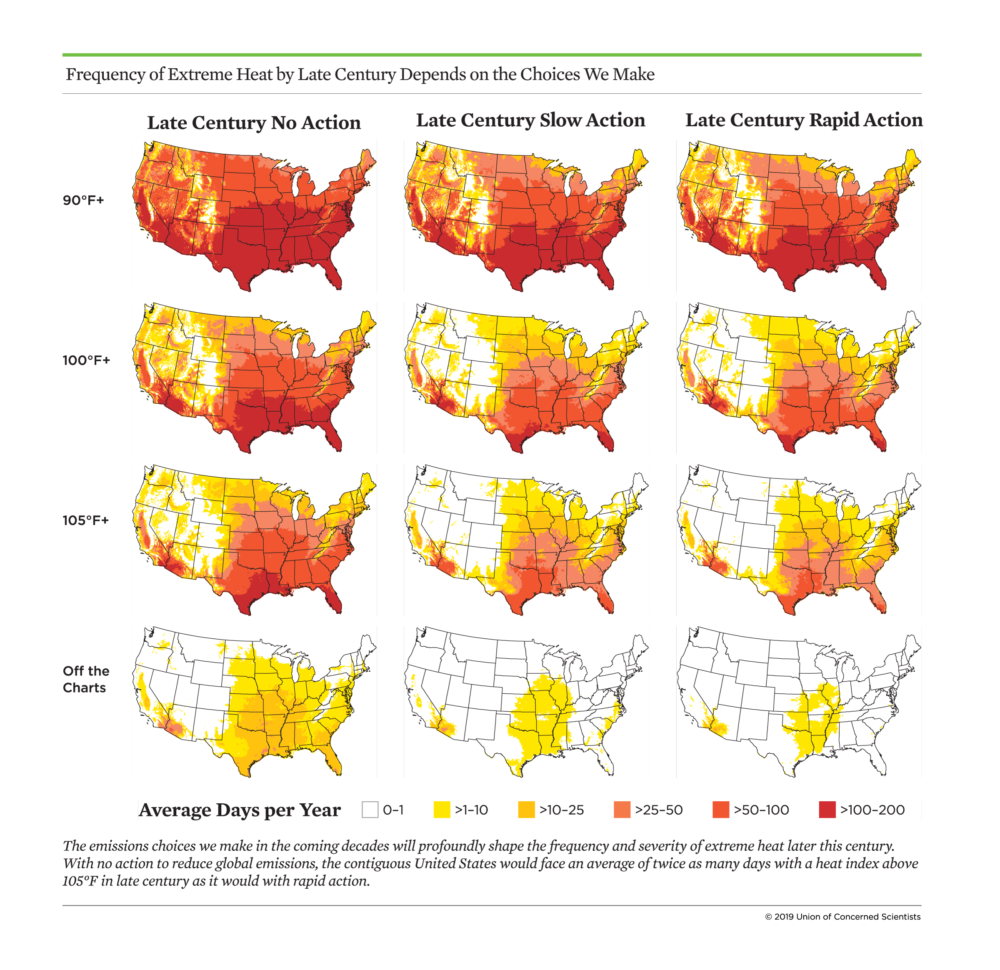Advertisement
Report: By 2100, Mass. Could Have 26 Days A Year That Feel Hotter Than 100 Degrees
Resume
Feeling the heat this summer? Well, it's just going to get worse.
Massachusetts is going to see more hot and humid days in the coming decades, according to a new analysis from the Union of Concerned Scientists.
Days that feel like 100 degrees (or higher), which rarely happen in Massachusetts now, will occur 26 times each year by the end of the century if no action is taken to cut greenhouse gas emissions, the report finds. Ninety degree temperatures will likely occur in the state about one month a year by 2050 and more than two months a year by 2100. Currently, the average is seven to 10 days.
“It’s very serious. We’re not talking about the dog days of summer. These are dangerous heat days,” says Erika Spanger-Siegfried, a senior climate analyst at the Cambridge-based Union of Concerned Scientists and a co-author of the report. “This is a dangerously hot world that we’re currently on a path headed for.”
“It’s very serious. We’re not talking about the dog days of summer. These are dangerous heat days."
Erika Spanger-Siegfried, Union of Concerned Scientists
The state currently issues a heat advisory when the daytime heat index — which factors in both heat and humidity — is above 100 degrees for more than two hours. Exposure to extreme heat can lead to heat-related illnesses like cramps, exhaustion and heatstroke.
If some action is taken to address warming temperatures, the number of hot days with still increase, but not as dramatically, according to Spanger-Siegfried.
Researchers studied three different scenarios — no action, slow action and rapid action to address emissions through the century. No action means there are no substantial efforts being made to address greenhouse gas emissions.
“And that’s essentially the path we’re on — emissions are rising,” Spanger-Siegfried says.
In all three of the scenarios, rising temperatures are inevitable.

Extreme heat has numerous long-term health effects, according to Renee Salas, an emergency medicine physician at Massachusetts General Hospital. Salas says certain populations — children, elderly and lower-income communities — are especially vulnerable to extreme heat. But no one is invincible.
"Heat can have really widespread effects," says Salas, who says extreme heat exposure is linked to heart disease and kidney disease. "It can increase respiratory disease like asthma attacks, there’s been links to worse pregnancy outcomes,” Salas adds. “What we understand so far is that heat has a lot of negative health impacts throughout the body.”
Even at a heat index of just above 80 degrees Fahrenheit, researchers have found negative health effects. Salas says public health officials and medical personnel should be aware of the health risks associated with extreme heat and help people find cool places.
“It’s been hard to live in Boston and not experience the impact of heat and seeing the days are hotter. I think there’s a growing recognition, but there is a lot of opportunity [for education],” Salas says.
Even though the report outlines some dire circumstances and consequences, Aaron Bernstein, co-director of the Center for Climate, Health and the Global Environment at Harvard T.H. Chan School of Public Health, says he found the analysis motivating.
"What we do right now makes a huge difference, not just by the end of the century. Right now. These things that we can do to improve how our cities, in particular, will benefit people,” Bernstein says. “What we do right now really matters to people’s health, and it will matter in 100 years."
This segment aired on July 16, 2019.